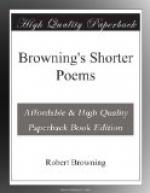Creative energy Browning has in high degree. With the poet’s insight into character and motives, the poet’s grasp of the essential laws of human life, the poet’s vividness of imagination, he has portrayed a host of types distinct from each other, true to life, strongly marked and consistent. With fine dramatic instinct he has shown these characters in true relation to the facts of life and to each other. In this respect he has satisfied the most exigent demands of art, and has already taken rank as one of the great creative minds of the nineteenth century.
True poet he is, also, in his depth of feeling and range of sympathy. Beneath a ruggedness of intellect, like his landscape in De Gustibus, there is always sympathy and tenderness. It is, indeed, more like the serenity of Chaucer’s emotions than like the tragic fervor of Shakespeare’s. Mrs. Browning’s estimate of him in Lady Geraldine’s Courtship,—
“Or from Browning some ‘Pomegranate,’
which, if cut deep down the middle,
Shows a heart within blood-tinctured,
of a veined humanity,”
is true criticism.
His love of nature, and his sense of the joy and beauty of it, appear often in his poetry; but not with the same insistence as in Wordsworth and Burns, and seldom with the same pervasiveness, or with the same beauty, as in Tennyson. He was rather the poet of men’s souls. When he does use nature, it is generally to illustrate some phase or experience of the soul, and not for the sake of its beauty. He has, however, some nature-descriptions so exquisite that English poetry would be the poorer for their loss. Witness De Gustibus, Up at a Villa, Home Thoughts from Abroad, Pippa’s Songs, and Saul.
It is too early to guess at Browning’s permanent place in our literature. But his vigor of intellect, his insight into the human heart, his originality in phrase and conception, his unquenchable and fearless optimism, and his grasp of the problems of his century, make him beyond question one of its greatest figures.
APPRECIATIONS
Shakespeare is not our poet, but the world’s,
Therefore, on him no speech! and brief
for thee,
Browning! Since Chaucer was alive
and hale
No man has walked along our roads with
step
So active, so inquiring eye, or tongue
So varied in discourse. But warmer
climes
Give brighter plumage, stronger wing:
the breeze
Of Alpine heights thou playest with, borne
on
Beyond Sorrento and Amalfi, where
The Siren waits thee, singing song for
song.
—WALTER SAVAGE LANDOR.
Tennyson has a vivid feeling of the dignity and potency of law.... Browning vividly feels the importance, the greatness and beauty of passions and enthusiasms, and his imagination is comparatively unimpressed by the presence of law and its operations.... It is not the order and regularity in the processes of the natural world which chiefly delight Browning’s imagination, but the streaming forth of power, and will, and love from the whole face of the visible universe....




